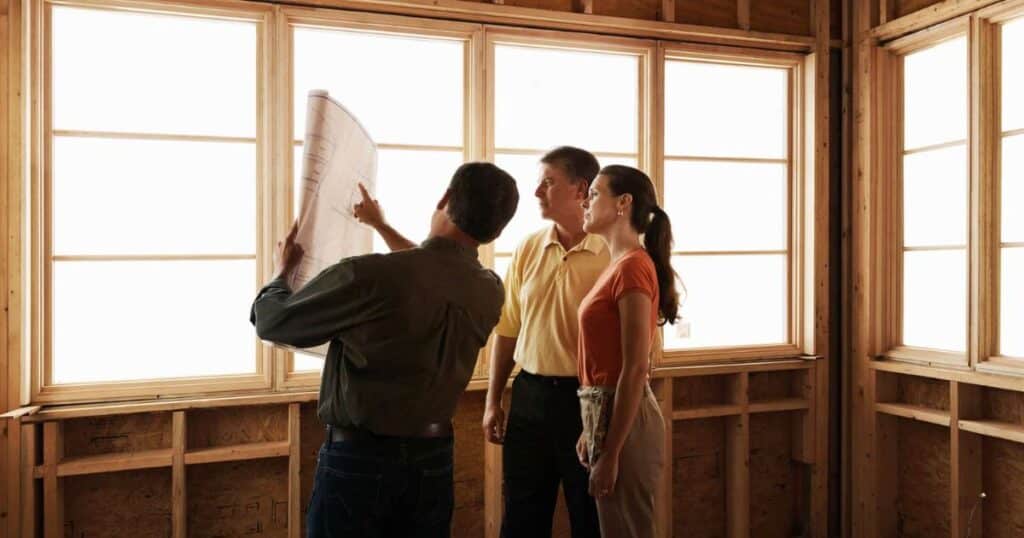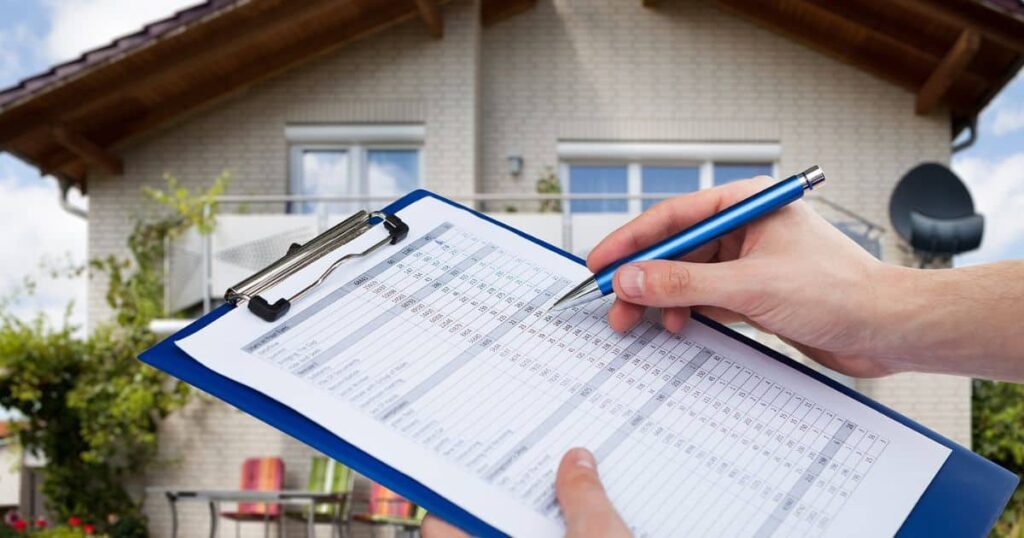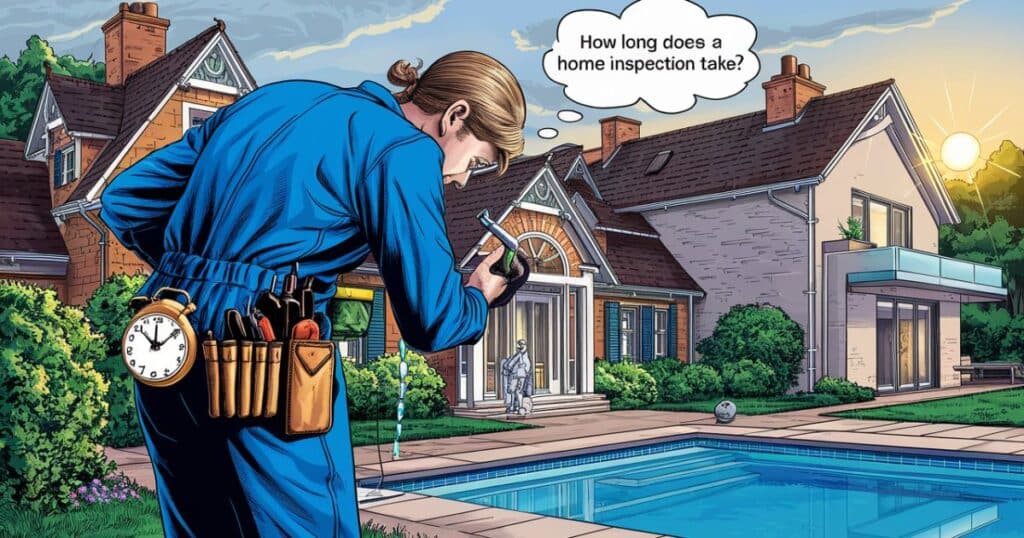Buying a home is one of the biggest investments most people will make in their lifetime. Before taking the plunge, it’s crucial to have a professional home inspector thoroughly evaluate the property to identify any potential issues or costly repairs that may be needed.
However, many buyers are unsure about how long this vital process takes. This comprehensive guide will delve into the various factors that determine the duration of a home inspection, equipping you with the knowledge to plan accordingly.
How long does a home inspection take on average?
The average home inspection typically lasts between 2-4 hours, but this can vary significantly based on several factors. A standard 2,000 square foot home in good condition may only require 2-3 hours, while a larger or older home with potential issues could take 4 hours or more.
According to a survey by the American Society of Home Inspectors (ASHI), the average time spent on a home inspection is approximately 3 hours and 35 minutes.
Major factors that determine the home inspection time

The size of the house
One of the most significant factors that influences the duration of a home inspection is the size of the property. Larger homes with more rooms, levels, and square footage will naturally require more time to inspect thoroughly. For instance, a 4,000 square foot home may take twice as long as a 2,000 square foot home.
When the house was built
The age of a home can also play a role in determining the inspection time. Older homes, especially those built before 1978 when lead-based paint was banned, often require more meticulous inspections to check for potential hazards like asbestos, outdated electrical systems, or structural issues. These homes may take longer to inspect as inspectors need to be extra vigilant in identifying potential problems.
The home inspector’s past experience
While experience shouldn’t compromise thoroughness, more seasoned home inspectors can often work more efficiently, potentially reducing the overall inspection time. On the other hand, newer inspectors may take longer to ensure they don’t miss any details during their evaluations.
Type of foundation
The type of foundation a home is built on can also affect the inspection time. Inspecting a basement or crawlspace foundation is typically quicker than inspecting a slab or pier and beam foundation, which may require more time to properly assess.
The condition of the home
Well-maintained homes in good condition can be inspected relatively quickly, while homes in disrepair or with visible issues will require more time to properly assess damages and potential repair needs.
The weather
Inclement weather like rain, snow, or extreme temperatures can slow down the inspection process, especially for exterior components such as the roof, siding, and foundation. Inspectors may need to take additional precautions or postpone certain aspects of the inspection until conditions improve.
Major systems
If the home has additional major systems like a well, septic tank, generators, or other specialized equipment, the inspection process will likely take longer to evaluate these components thoroughly.
Communication
Home inspectors who take the time to thoroughly explain and discuss their findings with the buyer and/or seller during the inspection process will naturally require more time on-site. However, this open communication can be invaluable in ensuring a clear understanding of any issues identified.
The report
Generating a comprehensive inspection report with detailed notes, photos, and recommendations can add an additional 30-60 minutes to the overall process. Inspectors often compile their findings and create the report after leaving the property.
Unveiling the Cost of Plaster Skimming a Room in the UK for American Homeowners
How the Covid-19 pandemic affected the average home inspection time
The Covid-19 pandemic introduced new challenges and protocols that impacted the duration of home inspections in various ways:
Added safety precautions
To minimize potential exposure, many home inspectors implemented additional safety measures during the pandemic, such as sanitizing equipment between inspections, maintaining social distancing protocols, and wearing personal protective equipment (PPE) like masks and gloves. These added precautions, while necessary, often extended the overall inspection time.
Solo inspections
To further reduce risks, many inspectors opted to conduct solo inspections without buyers present during the pandemic. While this eliminated the need for on-site communication and walkthroughs, it also removed the opportunity for buyers to ask questions or gain insights during the inspection process.
Thorough communication
The pandemic emphasized the importance of thorough communication and detailed reports, as many buyers were unable to attend inspections in person. Inspectors often spent more time ensuring their reports were comprehensive and engaging in virtual discussions to provide clarity for remote buyers, potentially increasing the overall duration.
What happens after the inspection?

Once the physical inspection is complete, the process is far from over. Here’s a general timeline of what happens next:
- Report Delivery: Most home inspectors aim to deliver their detailed report within 24-48 hours after the inspection. This report will outline all findings, including any issues or areas of concern identified during the evaluation.
- Review and Discussion: Buyers should carefully review the report, make note of any significant problems or repair needs, and discuss the findings with their real estate agent and/or the inspector if clarification is needed.
- Negotiation and Repairs: Based on the inspection report, buyers may choose to negotiate with the sellers for necessary repairs to be made or request credits/concessions to cover the costs. This back-and-forth negotiation process can take several days or weeks.
- Re-inspection (if needed): In some cases, a follow-up or re-inspection may be scheduled to verify that agreed-upon repairs have been completed satisfactorily before closing.
- Closing: Once all negotiations and repairs are finalized, the home buying process can proceed to closing, where ownership is officially transferred to the new homeowners.
Final points on how long home inspections take
While the duration of a home inspection can vary significantly based on the factors discussed, most inspections fall within the 2-4 hour range for a typical residential property. However, it’s essential to remember that a thorough and comprehensive inspection is crucial, regardless of the time commitment.
Here are some key points to keep in mind:
- Plan accordingly: When scheduling your home inspection, be prepared to dedicate at least a half-day to the process, and potentially more for larger or older homes.
- Don’t rush the process: A rushed or incomplete inspection could overlook critical issues, potentially leading to costly repairs or buyer’s remorse down the line.
- Experienced inspectors are valuable: While newer inspectors may take longer, more experienced professionals can often work efficiently without sacrificing quality.
- Open communication is key: Engage with your inspector throughout the process, ask questions, and ensure you understand their findings and recommendations.
- Review the report thoroughly: Take the time to carefully review the inspection report, as it will serve as your guide for negotiations and any necessary repairs.
Remember, a home inspection is a vital step in the home buying process, and the time investment upfront can save you from significant headaches and expenses in the future.
FAQs
How long does it take to get a home inspection report?
Most home inspectors aim to deliver their detailed reports within 24-48 hours after completing the on-site inspection. This timeframe allows them to compile their notes, photographs, and findings into a comprehensive report for the buyer’s review.
How long does it take to schedule a home inspection?
The timeline for scheduling a home inspection can vary depending on the availability of inspectors in your area and the time of year (peak home buying seasons tend to be busier). In general, it often takes 5-10 days to schedule an inspection after going under contract on a home.
Should a house seller be present at the home inspection?
While it’s not strictly necessary for the seller to be present during the home inspection, it is generally recommended that they (or their real estate agent) be available remotely in case the inspector needs to ask any clarifying questions or requires access to specific areas of the home.
How long does a home inspection report take?
The process of compiling the home inspection report, including organizing notes, photographs, and recommendations, typically takes the inspector 30-60 minutes after completing the physical inspection of the property.
How long does a home inspection take for a condo?
Condo inspections tend to be shorter than single-family home inspections due to the smaller size and fewer exterior components. In most cases, a thorough condo inspection can be completed within 1-2 hours.
By understanding the factors that influence the duration of a home inspection, as well as the timeline and processes involved, you can better prepare for this critical step in the home buying journey. Remember, a comprehensive inspection is an investment in your future home and peace of mind.







